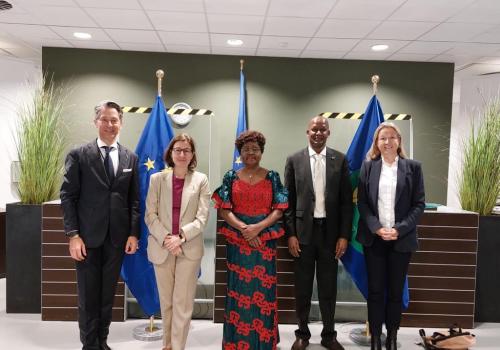The Annual Southern African Development Community (SADC)-European Union (EU) Senior Officials’ Political Dialogue was held on 8 June 2022 in Brussels, Belgium, and took stock of progress made on the actions agreed upon in the virtual Ministerial Dialogue held in June 2021.
The dialogue deliberated on contemporary development issues, including emerging regional and global challenges and facilitated exchanges on the programming of the 2021-2027 Regional Development Cooperatio The meeting was co-chaired by the Chairperson of the SADC Standing Committee of Senior Officials, His Excellency Dr Naomi Aretha Mkandawire Ngwira, Ambassador of Malawi to Belgium and Representative to the EU, and Ms Rita Laranjinha, Managing Director for Africa at the European External Action Service (EEAS).
The SADC side was represented by the SADC Double Troika whose current members are Botswana, the Democratic Republic of Congo, Malawi, Mozambique, Namibia and South Africa. The Secretariat was led by H.E. Mr Elias Magosi, SADC Executive Secretary. The EU was represented by officials from the EEAS and the European Commission’s Directrate General for International Partnerships.
A day before the dialogue, SADC was exposed to a full-day information session where various Directorates of the EU presented a range of programmes to sensitise SADC on policy instruments and tools used by the EU in implementing its development cooperation agenda, including aspects of programming.
These included EU’s Integrated Approach to External Conflicts and Crisis, EU's Common Security and Defence Policy (CSDP) Training Missions, European Peace Facility, Early Response Mechanism, Peace Building and Mediation and Humanitarian Activities; and updates on the 2021-2027 Multi-annual Indicative Programme for Sub Saharan Africa (MIP SSA).
The dialogue commended the encouraging progress in the implementation of the resolutions of the Ministerial Dialogue of June 2021. Two key milestones were lauded, one being the successful EU hosting of the 6th African Union-EU Summit held from 17 to18 February 2022 and the other being the adoption of the Global Africa-Europe Gateway Investment Package. Both sides acknowledged that the latter will offer an avenue to strengthen cooperation and investments in the areas of climate change, global health security, sustainable development and supply chains.
However, there remained concerns on two issues, the continued imposition of sanctions on the Republic of Zimbabwe; and the restrictive measures on wildlife conservation. In this regard, both sides committed to promoting dialogue on the reform agenda of Zimbabwe, and cooperating under the NaturAfrica Initiative in supporting biodiversity conservation.
The dialogue received updates on the political and security situations in both the SADC and EU regions and noted that the SADC Region has largely remained peaceful and stable, notwithstanding isolated challenges in some Member States. The relevant Organ Structures remain seized in collaborating with cooperating partners to provide the necessary regional support aimed at arresting the prevailing political and security challenges.
On the other hand, the EU expressed concerns about the ongoing war in Europe and the resultant loss of lives and the socio-economic impact that has exposed the global economy to risks of food and energy insecurity. The EU expressed commitment to collaborate with the United Nations in the ongoing multilateral initiatives aimed at upholding the United Nations Charter and international law.
The dialogue noted the socio-economic impact of the COVID-19 pandemic, particularly in sectors such as health, education, water and sanitation, and the mitigation measures implemented at national and regional levels. SADC expressed appreciation for the continued EU COVID-19 support extended through the ongoing programme portfolio of the 11th European Development Fund (EDF).
Both sides acknowledged that great progress has been achieved in the production and distribution of COVID-19 vaccines. However, the prevailing challenge is the substantial amount of vaccine hesitation. In this regard, the role of social and mainstream media in catalysing the demand for vaccination needed to be strengthened in the pursuit to achieve herd immunity thresholds.
The access and manufacturing of vaccines remain the key agenda in the 2021-2027 regional cooperation development framework, whilst trade-related initiatives for achieving equitable demand and supply of vaccines will be addressed in the relevant platforms of the World Trade Organisation.
Regarding future cooperation, the EU apprised SADC that a 2021-2027 Multiannual Indicative Programme for Sub Saharan Africa (MIP SSA), with a global resource envelope of €10.2 billion was approved in December 2021. The priorities of the MIP SSA are fairly aligned to the SADC Vision 2050 and the strategic priorities of the Regional Indicative Strategic Development Plan (RISDP 2020-2030).
In this regard, consultations on the identification and formulation of programmes under the MIP SSA are ongoing. In the context of SADC, the consultations are facilitated through the EU Delegation in Botswana and through regular programming dialogue platforms between the EU and Regional Economic Communities (RECs) both at the high and technical levels. The MIP SSA embraces the Team Europe Initiative and will support the implementation of the Global Africa-Europe Gateway Investment Package.
On trade and investment, the dialogue expressed commitment to strengthen trade relations between the SADC and EU regions, through the trade aspects of the adopted Global Africa-Europe Gateway Investment Package and the SADC-EU Economic Partnership Agreement (EPA). Both sides acknowledged that the Africa Continental Free Trade Area (AfCFTA) is inherently a game-changer in the promotion of intra-trade, sustainable development, regional and continental integration.
To facilitate the promotion of trade, both sides agreed to undertake information exchanges on the EU’s Coordinated Maritime Presence Framework and the Carbon Border Adjustment Mechanism that seeks to promote climate-neutral growth. Both sides reiterated their commitment to promoting regional cooperation and partnership and unanimously agreed that the dialogue platform is catalytic in this endeavour. The next Ministerial Dialogue will be convened in 2023 in the SADC Region.

